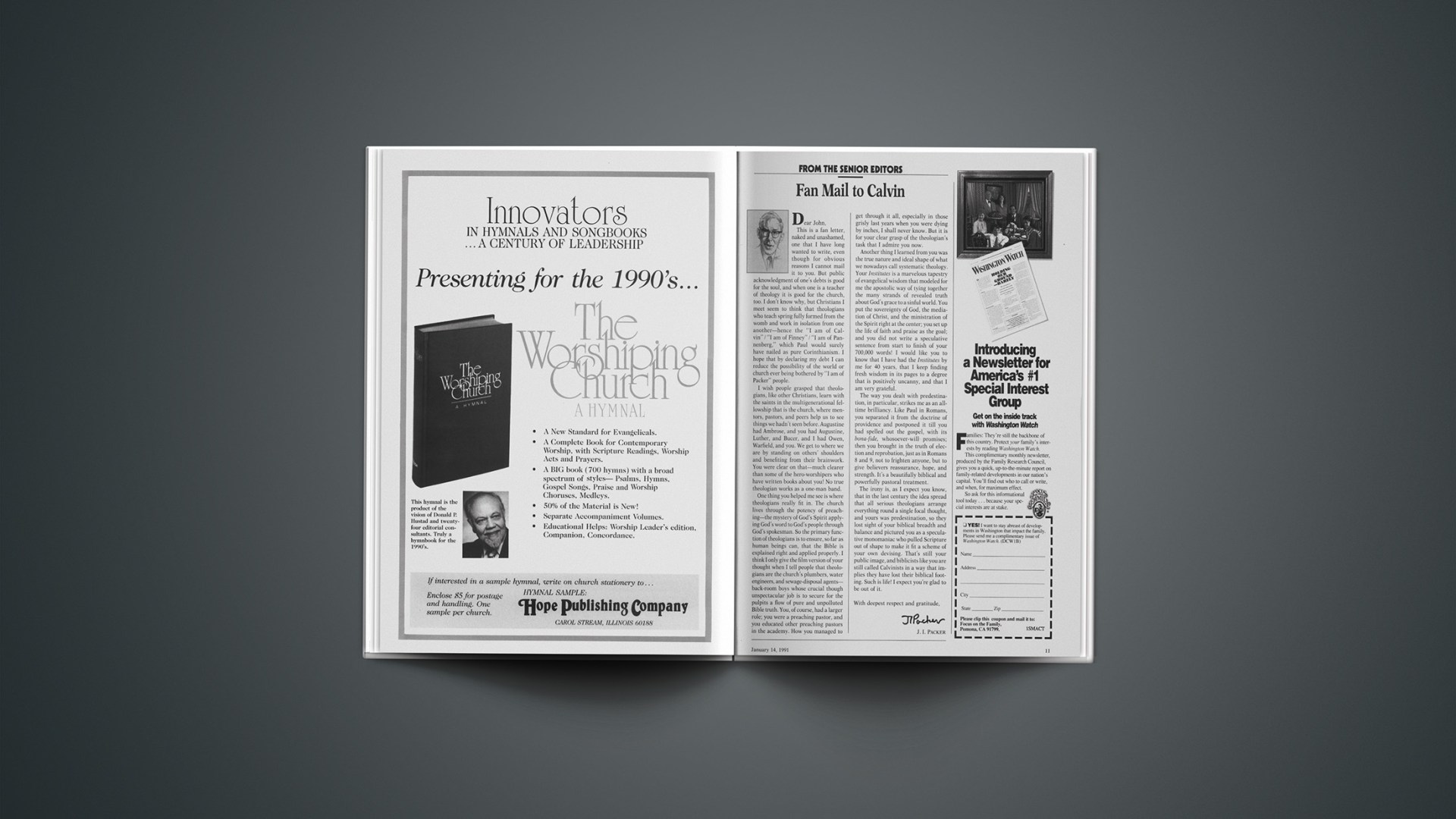Dear John,
This is a fan letter, naked and unashamed, one that I have long wanted to write, even though for obvious reasons I cannot mail it to you. But public acknowledgment of one’s debts is good for the soul, and when one is a teacher of theology it is good for the church, too. I don’t know why, but Christians I meet seem to think that theologians who teach spring fully formed from the womb and work in isolation from one another—hence the “I am of Calvin” / “I am of Finney” / “I am of Pannenberg,” which Paul would surely have nailed as pure Corinthianism. I hope that by declaring my debt I can reduce the possibility of the world or church ever being bothered by “I am of Packer” people.
I wish people grasped that theologians, like other Christians, learn with the saints in the multigenerational fellowship that is the church, where mentors, pastors, and peers help us to see things we hadn’t seen before. Augustine had Ambrose, and you had Augustine, Luther, and Bucer, and I had Owen, Warfield, and you. We get to where we are by standing on others’ shoulders and benefiting from their brainwork. You were clear on that—much clearer than some of the hero-worshipers who have written books about you! No true theologian works as a one-man band.
One thing you helped me see is where theologians really fit in. The church lives through the potency of preaching—the mystery of God’s Spirit applying God’s word to God’s people through God’s spokesman. So the primary function of theologians is to ensure, so far as human beings can, that the Bible is explained right and applied properly. I think I only give the film version of your thought when I tell people that theologians are the church’s plumbers, water engineers, and sewage-disposal agents—back-room boys whose crucial though unspectacular job is to secure for the pulpits a flow of pure and unpolluted Bible truth. You, of course, had a larger role; you were a preaching pastor, and you educated other preaching pastors in the academy. How you managed to get through it all, especially in those grisly last years when you were dying by inches, I shall never know. But it is for your clear grasp of the theologian’s task that I admire you now.
Another thing I learned from you was the true nature and ideal shape of what we nowadays call systematic theology. Your Institutes is a marvelous tapestry of evangelical wisdom that modeled for me the apostolic way of tying together the many strands of revealed truth about God’s grace to a sinful world. You put the sovereignty of God, the mediation of Christ, and the ministration of the Spirit right at the center; you set up the life of faith and praise as the goal; and you did not write a speculative sentence from start to finish of your 700,000 words! I would like you to know that I have had the Institutes by me for 40 years, that I keep finding fresh wisdom in its pages to a degree that is positively uncanny, and that I am very grateful.
The way you dealt with predestination, in particular, strikes me as an all-time brilliancy. Like Paul in Romans, you separated it from the doctrine of providence and postponed it till you had spelled out the gospel, with its bona-fide, whosoever-will promises; then you brought in the truth of election and reprobation, just as in Romans 8 and 9, not to frighten anyone, but to give believers reassurance, hope, and strength. It’s a beautifully biblical and powerfully pastoral treatment.
The irony is, as I expect you know, that in the last century the idea spread that all serious theologians arrange everything round a single focal thought, and yours was predestination, so they lost sight of your biblical breadth and balance and pictured you as a speculative monomaniac who pulled Scripture out of shape to make it fit a scheme of your own devising. That’s still your public image, and biblicists like you are still called Calvinists in a way that implies they have lost their biblical footing. Such is life! I expect you’re glad to be out of it.
With deepest respect and gratitude,
J.I. Packer










